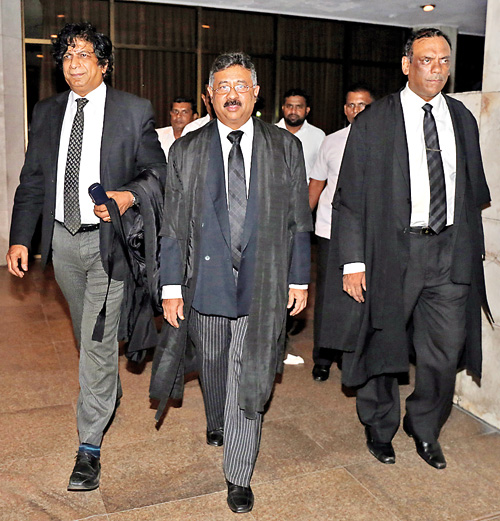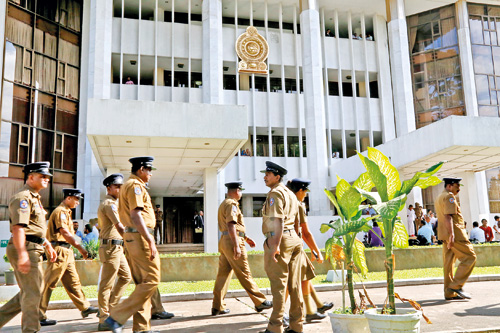News
SC reserves order on petitions challenging President’s action
The Supreme Court on Friday reserved order on the Fundamental Rights petitions filed against President Maithripala Sirisena’s gazette notification to dissolve Parliament. Accordingly, the interim order suspending the gazette notification was extended until the court’s order is given.

Solicitor General Dappula de Livera (left) and Attorney General Jayantha Jayasuriya (centre) arriving in court on Friday
On four days this week, a seven-member bench headed by Chief Justice Nalin Perera heard submissions from lawyers representing 10 petitioners and eight intervening petitioners. Though the hearings had originally been scheduled for three days, the court continued for an extra day.
Hearing of the petitions finally ended at about 7.30pm on Friday.
Aside from the Chief Justice, the other members on the bench are Justices Buwaneka Aluwihare, Sisira J. de Abrew, Priyantha Jayawardena, Prasanna S. Jayawardena, Vijith K. Malalgoda, and Murdu Fernando.
The hearings began with the petitioners’ counsel making their submissions. Attorney General Jayantha Jayasuriya then made submissions for the respondents. Thereafter, the intervening petitioners’s counsel made submissions. After that, the petitioners’ counsel responded. The hearings concluded with the AG’s summing up.
The bench listened patiently to all the counsel, and even asked questions when the judges wanted clarifications.
Tight security was in place at the Supreme Court complex on all four days of the hearings. Police and Special Task Force (STF) personnel were posted at various places.
Opposition Leader R. Sampanthan’s counsel K. Kanag-Iswaran pointed out that the President could dissolve Parliament only after it completes four and a half years of its five-year term. If the President wished to dissolve Parliament before that, he could only do so if two thirds of the MPs approved a motion and sent it to him.
He pointed out that the President’s action was not in line with these two provisions in the Constitution. Therefore, the President’s gazette notification was contrary to the Constitution, he argued.
The United National Party’s counsel Thilak Marapana pointed out that the dissolution of Parliament under Article 62(1) of the Constitution must take place within the provisions set out in Article 70(1). As these provisions had been ignored, the dissolution in this instance was illegal, he stressed.

Police are seen leaving the Supreme Court premises on Friday. Pix by Lahiru Harshana and M.A. Pushpa Kumara
Janatha Vimukthi Peramuna’s counsel J.C. Weliamuna said that the contents of the affidavit submitted by the President’s Secretary justifying the dissolution could not be accepted.
Attorney General Jayantha Jayasuriya who appeared for the respondents along with Solicitor General Dappula de Livera, argued that if the President had violated the Constitution, only Parliament could take action against him. Stating that the SC had no jurisdiction to hear FR petitions against the dissolution of Parliament, he requested court to dismiss all such petitions. The AG noted that the President’s actions could not be challenged through an FR petition.
He said the President had dissolved Parliament using powers vested in him under the Constitution, and that the petitioners’ fundamental rights had not been violated by the dissolution.
The AG also responded to Mr. Kanag Iswaran’s argument that under the 19th Amendment, the President’s acts or actions had not been conferred immunity. The AG claimed that the President still enjoyed such immunity when he discharged the powers vested in him under the Constitution, and that this could not be challenged by an FR petition.
Sri Lanka Podujana Peramuna (SLPP) Chairman G.L. Peiris’ counsel Sanjeeva Jayawardena, argued that the Constitution’s Article 62 (2) further afforded the President the power to dissolve Parliament before the completion of its term. He pointed out that Article 62 (2) was used by Presidents to dissolve all but one Parliament since 1978.
Parliamentarian Udaya Gammanpila’s counsel Manohara de Silva requested the court to dismiss the petitions challenging the President’s actions, stating that the SC’s main responsibility was to uphold fundamental rights laid down in the Constitution and that if the court was to grant the relief requested by the petitioners, it would violate the fundamental right to universal franchise affirmed in the Constitution.
| LawAsia heads commend SC proceedings | |
| LawAsia current president Chris Leong and immediate past president Prashant Kumar were in Sri Lanka this week to observe the proceedings of the petitions that were argued in the Supreme Court challenging the dissolution of Parliament.They were of the view that the Sri Lankan Constitution was unique as it contained clarity leaving no doubt for interpretation. They also commented that Sri Lankan judges had demonstrated courage and maintained independence at all times. They also commended the manner in which the proceedings were conducted and the patience and tolerance displayed when the cases were being argued. They were in Sri Lanka on an invitation extended by former president of the Bar Association of Sri Lanka, Upul Jayasuriya PC. |

